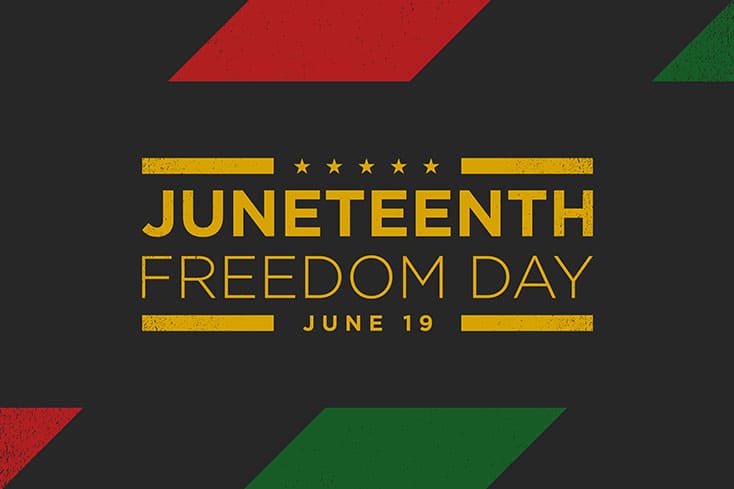June 17, 2021
By Daniel H. Gillison

Our offices here at NAMI will be closed Friday in in honor of Juneteenth. We are encouraging our staff to use the day for celebration, education and reflection. It’s a time for us to learn about the continued impact of trauma caused by slavery, to recognize the strength and resilience of the Black community, and to consider what freedom, healing and leadership mean in the context of our nation’s complicated history of oppression.
Juneteenth is observed on the anniversary of June 19, 1865, when the news of the Emancipation Proclamation finally reached Texas (two and a half years late). While this day commemorates the end of slavery in the United States, it’s important to acknowledge that it was only the beginning of freedom. After all, many slave owners deliberately withheld the news of slaves’ emancipation until the completion of the following harvest season. And even afterward, former slaves remained in economic bondage through sharecropping well into the late 19th century; Jim Crow laws continued to regulate and restrict Black people’s freedom well into the early 20th century; and to this day, people of color continue to be exploited, dehumanized and disenfranchised through countless systemic injustices.
As we celebrate Juneteenth, which is also known as Freedom Day, we are reminded that there is a difference between “not enslaved” and “free.” Just as there is a difference between “not dead” and “alive.” Just as there is a difference between “not sick” and “healthy.” And just as there is a difference between “not racist” and “anti-racist.”
Just as the work toward freedom was not finished by merely issuing the Emancipation Proclamation in 1863, our work cannot be done today by merely issuing statements of support for Black Lives Matter or against racist, hateful and tragic incidents across the country. Juneteenth is a reminder to remain critical about progress measured. We must continue to insist on digging deeper than performative appearances of progress and surface level solutions if we want to create actual change.
Here at NAMI, we have begun the work to become a more just, equitable, diverse and inclusive organization. And we are continuing to intentionally create culturally competent mental health resources for communities of color. But our work is far from over.
The wounds of historical, generational racial trauma run deep. And while confronting trauma is never easy, the willingness to be vulnerable and honest about it is always the first step toward healing. Juneteenth is an opportunity for us as an organization, as individuals and as a country to do just that.
Some days may feel like three steps forward; other days may feel like two steps back. That’s ok. The important thing is that we don’t give up. That both together and by ourselves we keep striving, that we keep hoping, and that we keep building on the legacy of freedom our ancestors began.
There is a saying in mental health: recovery is not linear. Healing is a work in progress. It turns out, freedom is too.
Juneteenth Resources:
 Daniel H. Gillison, Jr. is the chief executive officer of NAMI (National Alliance on Mental Illness). Prior to his work at NAMI, he served as executive director of the American Psychiatric Association Foundation (APAF) in addition to several other leadership roles at various large corporations such as Xerox, Nextel, and Sprint. He is passionate about making inclusive, culturally competent mental health resources available to all people, spending time with his family, and of course playing tennis. You can follow him on Twitter at @DanGillison.
Daniel H. Gillison, Jr. is the chief executive officer of NAMI (National Alliance on Mental Illness). Prior to his work at NAMI, he served as executive director of the American Psychiatric Association Foundation (APAF) in addition to several other leadership roles at various large corporations such as Xerox, Nextel, and Sprint. He is passionate about making inclusive, culturally competent mental health resources available to all people, spending time with his family, and of course playing tennis. You can follow him on Twitter at @DanGillison.
We’re always accepting submissions to the NAMI Blog! We feature the latest research, stories of recovery, ways to end stigma and strategies for living well with mental illness. Most importantly: We feature your voices.
LEARN MORENAMI HelpLine is available M-F, 10 a.m. – 10 p.m. ET. Call 800-950-6264,
text “NAMI” to 62640, or email. In a crisis, call or text 988 (24/7).